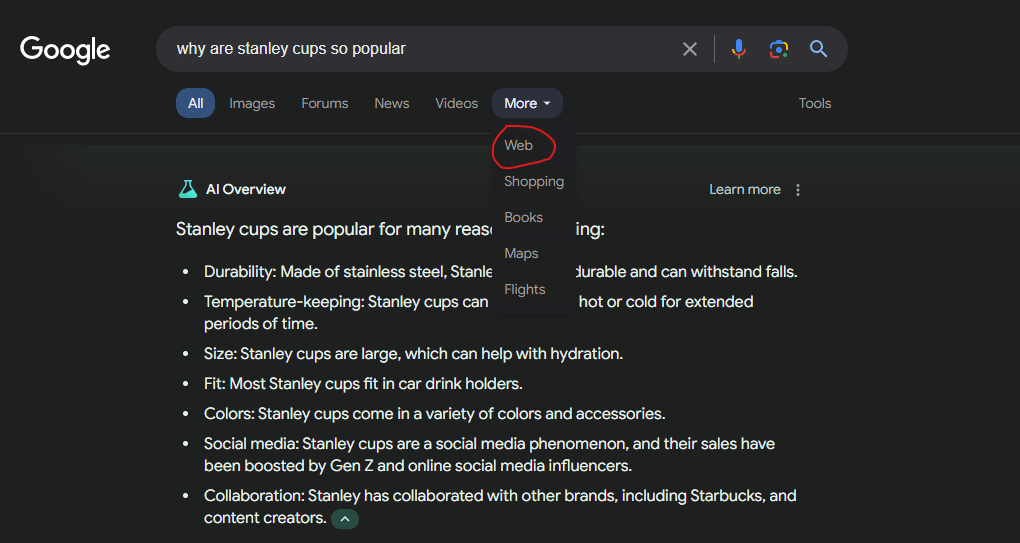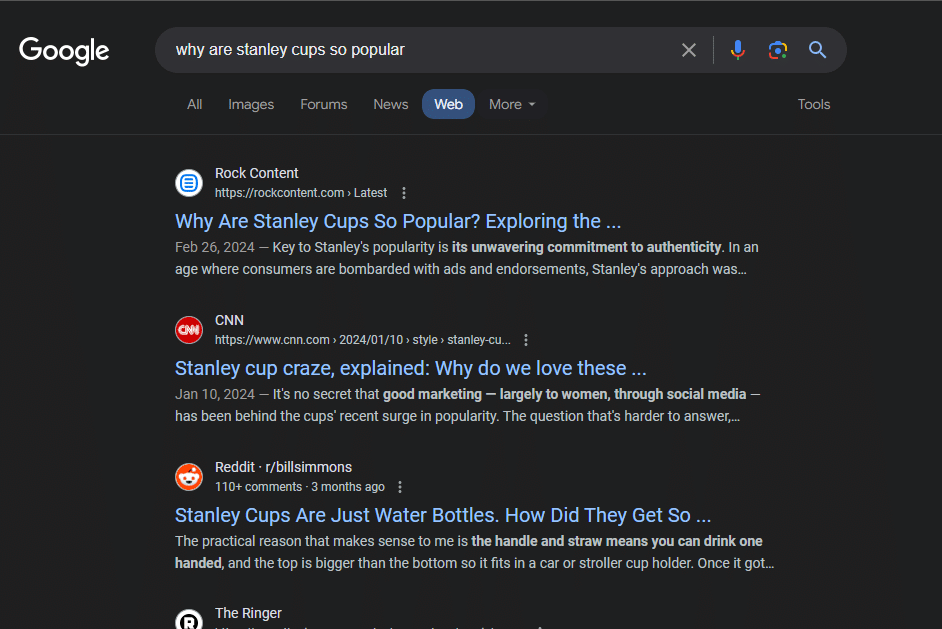On May 14th, during its annual Google I/O conference— and just one day after OpenAI unveiled ChatGPT-4o to the world on May 13, 2024—Google introduced AI Overviews, an enhancement of what was previously known as the Search Generative Experience (SGE).
This breakthrough represents not just a step, but a leap forward in how search engines operate, aiming to fundamentally transform the user experience across the globe.
AI Overviews mark an evolution from the traditional list of links to a more intuitive and integrated approach, where AI-generated summaries offer a quick grasp of topics right at the top of search results. Some experts even called May 14th as ‘day zero’ of Google search.
This change is designed to streamline information retrieval, allowing users to quickly understand complex topics without navigating away from their initial search query.
By refining the capabilities first introduced with SGE, Google continues to push the boundaries of what AI can achieve in search—making it faster, more accurate, and remarkably user-friendly.
As AI Overviews roll out to users in the United States with plans for a global expansion, both casual searchers and professional marketers must pay attention.
The implications for search behavior, content strategy, and digital marketing are profound. In this article, we will explore what AI Overviews entail and what their introduction means for the future of searching on the web.
- Overview of AI Overviews (yes, I did that): The Evolution of Search
- Google Does the Googling for You
- Innovations in Query Processing
- The Promise of Video Queries
- The Impact of AI Overviews on Marketing Strategies
- TL;DR
Overview of AI Overviews (yes, I did that): The Evolution of Search
Initially introduced last year as SGE, the technology has been refined and kind of rebranded to AI Overviews, which better encapsulates its functionality—providing a comprehensive snapshot at the top of the search results.
This shift is more than semantic; it represents a deeper integration of Artificial Intelligence into everyday search activities. Google’s new Gemini model is at the heart of this transformation, customized specifically for search tasks to enhance accuracy and user experience.
In the video below, you can see an example of how this kind of research works:
Until the end of the year, billions of Google users will soon see AI-generated summaries at the top of many search results, marking a significant change in how search functions.
Below, you can see the video publicity that was announced at the conference:

Google Does the Googling for You
The cornerstone of AI Overviews is the idea that “Google will do the Googling for you.” This approach is fundamentally about efficiency and depth. Users no longer need to piece together information from multiple links.
Instead, they can pose a question—however complex—and receive a synthesized answer that not only responds to the query but also offers a range of perspectives and further reading links in a carousel way. You can ask your question with all its sub questions and get an AI overview in seconds.
To illustrate how Google AI Overviews operates, consider this specific example provided at the Google conference. Suppose you ask, “Find the best yoga or pilates studios in boston and show details on their intro offer and walking time from beacon hill”.
Rather than merely presenting a list of links, it synthesizes information from various sources such as fitness blogs, local business directories, and customer reviews to deliver a complete answer with all the most relevant information about what you have asked.
You get some studios with great ratings and intro offers, with the distance by walking. All that in a single search.
This has not changed a lot considering what we have analyzed with Google SGE recently. The idea remains the same: this system leverages real-time information processing, unparalleled ranking, and quality assessment systems to deliver the best of what the web has to offer directly to the user.
So it’s not without reason that Google states: “Take a look at some of the new ways AI in Search can do the hard work so you don’t have to. Just ask”. You really don’t have to do anything besides ask.
David Imel, in the podcast episode “Hey ChatGPT, Summarize Google I/O” from WVFRM Podcast:
“I think they are trying to completely reframe in your mind what it means to search for something. They don’t want you to have to search for something, and then find the information for yourself. Actually, what they kept saying, over and over again, is: ‘Let Google do the Googling for you’”.
Innovations in Query Processing
One of the most significant advancements presented in the conference by Elizabeth (Liz) Reid, VP and Head of Google Search, is the capacity to handle complex queries effectively.
What makes it possible it’s the ‘multistep reasoning’. This involves breaking down a multifaceted question into its component parts, determining the sequence in which to address each aspect, and then delivering a cohesive answer. Liz explains how this works:
“The Gemini model acts as your AI agent, using what we call multistep reasoning. It breaks down your bigger question into all its parts and figures out which problem it needs to solve and in what order. Thanks to our real-life info and ranking expertise, it reasons to use the highest quality information out there”.
This method dramatically expands the potential of what can be achieved with a simple search prompt, turning intricate, multi-layered inquiries into straightforward answers with minimal user effort involved.
AI Overview will not always be the best choice
While AI Overviews represent a groundbreaking advancement in search technology, their appearance in Google Search results is selective and context-dependent.
Google is gradually rolling out this feature to more users, languages, and regions, activating AI Overviews only when they are most beneficial.
Specifically, these overviews are triggered when generative AI can significantly enhance a user’s understanding of complex topics by synthesizing information from multiple sources.
This strategic deployment ensures that AI Overviews provide substantial value when needed, while maintaining the traditional search experience for simpler queries.
The Promise of Video Queries
A particularly exciting development is the introduction of video-based querying in Google Search.
Soon, users will be able to ask questions by simply capturing a video, making the search process even more intuitive and aligned with natural human behaviors.
This capability not only enriches the user experience but also sets a new standard for accessibility and interaction within digital search environments.
You can see the demonstration in the video below:
The Impact of AI Overviews on Marketing Strategies
Google’s move to an AI-driven search interface represents a significant shift in how users interact with search engines.
We’ve been observing this for some time, with SGE experiments, reviews, analysis from experts and so on. However, with the recent announcement and the integration of this technology into standard U.S. search practices, the impact feels more immediate and tangible than ever before.
For marketers, this evolution means adapting to a landscape where users expect immediate, comprehensive insights at the top of their search results.
This change necessitates a focus on producing content that not only ranks well but also succinctly summarizes key information to meet the criteria of AI Overviews.
This is something we have already discussed in our analysis of Google SGE: the AI answer page occupies the entire first page.
And with Google AI Overviews, we have an option in the side bar that’s called (surprisingly) web. Where you can find (guess what) results in the ‘old way’, in other words, a list of blue web links, like in the images below:


Consequently, ranking well becomes more challenging and even more critical — occupying the first position might not be as advantageous as it once was, but it’s essential to be seen as relevant, and to demonstrate expertise and experience so that Google’s AI might consider you as a source for its answers.
And how to do it? GEO might be the answer. The advent of Generative Engine Optimization (GEO) signifies a pivotal shift in SEO practices, aligning them with the capabilities of AI-driven search engines like Google’s now AI Overviews and Microsoft’s Bing Chat.
GEO adapts traditional SEO strategies to the era of AI by optimizing content for these generative engines. This new approach is crucial for content creators aiming to thrive in an increasingly AI-dominated search environment.
Understanding and implementing GEO strategies can significantly enhance the visibility of content within AI-driven search environments. This is particularly important as these engines do not simply fetch information but create rich, integrated responses that can satisfy user queries directly, potentially bypassing the need to click through to websites.
Content Strategy Adaptation
As Google allows users to “let Google do the googling,” marketers must rethink their content strategies. The AI’s ability to pull together comprehensive answers from various sources requires that web content be both information-rich and highly relevant.
This might push marketers to develop more detailed, authoritative content that can be easily synthesized by Google’s AI to appear in Overviews. Yes, we’re talking, once again, about EEAT and expert-driven content.
As Google enhances its search capabilities with AI, marketers are prompted to adapt their content strategies significantly. The emphasis on EEAT (Expertise, Authoritativeness, Trustworthiness, and Experience) and expert-driven content is more crucial than ever in aligning with the AI’s criteria for high-quality sources.
EEAT evaluates the credibility and user experience provided by the content, while expert-driven content leverages deep, specialized knowledge to offer detailed, authoritative insights. This blend not only enriches the information pool but also elevates the content’s visibility in AI-generated search overviews.
Expert-driven content naturally boosts EEAT by delivering content rooted in expertise and professional experience. This approach signals to Google’s AI that the content is both reliable and valuable, making it more likely to be featured in AI Overviews.
By prioritizing EEAT and integrating expert insights, marketers can enhance their SEO effectiveness, ensuring their content resonates well within the new AI-driven search dynamics.
User Engagement and Conversion
While AI Overviews might initially decrease the number of clicks to actual web pages, they also present an opportunity for marketers to capture interest quickly. If the AI pulls content from your site into the overview, this could increase brand visibility and perceived expertise.
Marketers will need to be strategic about content placement and the use of structured data to ensure visibility in both AI Overviews and traditional search listings.
Business and User Implications
As reported by Michael Liedtke in AP News, there is concern among publishers about the potential economic impact of AI Overviews.
As we stated, the technology’s ability to synthesize content could lead to a decrease in traditional page visits, affecting ad revenues critically.
This is something that we’re already talked about, particularly because we’ve seen how traffic has dropped, and CTR keeps decreasing with time. According to the “2024 Digital Experience Benchmark Explorer“, a study by Contentsquare, 55% of websites across various industries experienced a decline in traffic in 2023 compared to the previous year. If it’s already like that in general, what can we expect in the future?
Marc McCollum, chief innovation officer at Raptive, noted that about 25% of web traffic could be negatively affected by the new search features, which might result in significant revenue losses for content creators and publishers who rely on ad impressions, as presented by Michael Liedtke in his article.
Shift in Publisher Dynamics
The introduction of AI into Google’s search ecosystem has also altered its long-standing symbiotic relationship with content publishers.
By using their content to train its AI models, Google is essentially shifting value from publishers to its platforms, which McCollum describes as a “transfer of wealth” from small, independent businesses to larger tech corporations.
Despite these concerns, Google’s testing has revealed that AI Overviews lead to an increase in searches, as users are prompted to ask more complex questions that were previously too challenging.
“Because they suddenly can ask questions that were too hard before,” Liz Reid explained in an interview with The Associated Press. However, specific data on link-clicking volumes during the tests were not disclosed.
Reid further emphasized the continued interest in deeper exploration, “In reality, people do want to click to the web, even when they have an AI overview. They start with the AI overview and then they want to dig in deeper.” This interview was conducted by The Associated Press, providing insights into the evolving impact of AI on search behaviors.
This indicates that while the overviews provide a starting point, they do not necessarily replace the deeper engagement that comes with visiting actual web pages.
If this is really true, we have to wait and see.
Testing and Analytics
Marketers must employ rigorous testing and analytics to understand how changes in Google’s search features affect user behavior.
Analyzing trends in search query responses and adapting to the feedback loop provided by AI Overviews will be critical.
This means continuously refining content to align with what AI finds most useful and relevant, potentially shifting how marketers evaluate their online content’s effectiveness.
Marketers must employ rigorous testing and analytics to understand how changes in Google’s search features, including AI Overviews, affect user behavior.
The recent data collected by Brodie Clark, an independent SEO Consultant, provides valuable insights into the deployment of AI Overviews.
Brodie Clark’s insights from Semrush Sensor reveal that as of May 17th, AI Overviews were officially tracked as a SERP feature, akin to other elements like “People Also Ask,” image snippets, and sitelinks, for non-logged-in users in the US.
Important statistics from Clark’s data indicate that AI Overviews appear in a small fraction of searches—0.55% on desktop and 0.81% on mobile.
Of course, this is likely to change soon. Not only the numbers themselves, but how SEMRUsh is collecting this data — and that’s why it’s important to continue monitoring how your site appears in the SERP. However, it’s reassuring to know that a widely used tool like SEMrush is already allowing this kind of overview.


The Impact of AI on Research Skills
Last but not least, we may only fully realize the impact of these changes in the years to come. The transformation initiated by Google’s AI-driven search could have long-lasting effects on how future generations interact with and process information.
Marques Brownlee, another participant in the podcast episode “Hey ChatGPT, Summarize Google I/O” by WVFRM Podcast, raises a poignant concern regarding the long-term implications of Google’s AI-driven search overviews, particularly for younger generations.
As Google AI increasingly synthesizes and presents comprehensive answers at the top of its search results, there’s a growing apprehension that children might not develop the critical skill of navigating through search results to validate and deepen their understanding of information.
Brownlee and his companions fear that this new search paradigm, where the first presented answer is often taken as the most accurate, could diminish users’ incentives to question or fact-check the information, potentially fostering a passive acceptance of data.
This shift could fundamentally alter how future generations interact with information and the SERP, moving away from the traditional, more investigative approach to one that might overly rely on AI-generated responses without sufficient skepticism.
This change highlights a broader conversation about the role of technology in shaping critical thinking and research skills in an era where the ease of access to information could ironically lead to less informed individuals.
This is something that people are already talking about since the advance of TikTok as a search engine for young people, but once again, it seems to be more real now.
TL;DR
Introduced by Google on May 14th, AI Overviews represent a significant advancement in search technology, transitioning from the traditional list of links to providing AI-generated summaries at the top of search results.
These overviews, initially launched as part of the Search Generative Experience (SGE) and now fully rolled out to all U.S. users, aim to offer users a quick grasp of complex topics directly from the search results page. As a Generative Engine, it generates a response to your query by topic, including text, images, list, Google Maps places etc. depending on what you ask.
By summarizing key information using AI, Google enables users to understand the essence of their queries without the need to sift through multiple web pages.
The rollout of AI Overviews to all US users marks the beginning of a global expansion, raising concerns that have been percolating since the concept’s initial unveiling as Google SGE throughout 2023.
One of the primary concerns is the potential decrease in web traffic and the challenges it poses for digital marketing and monetization strategies. The AI’s ability to satisfy queries with synthesized responses may reduce the number of user clicks to external websites, impacting ad revenues and content engagement.
However, this development also presents a unique opportunity: if your content is selected as a source by the AI, it will be featured in a carousel, standing out prominently compared to other results. This enhanced visibility can, as Liz mentioned, increase the likelihood of clicks and drive deeper engagement with your content.
This dynamic requires continuous monitoring and adaptation by marketers and content creators, as the landscape of digital information consumption is clearly evolving.
For those looking to navigate this new era effectively and ensure their content strategies are aligned with the latest advancements in search technology, Rock Content offers tailored solutions in the content marketing space.
To explore how we can help you create quality content that resonates with both AI algorithms and human audiences, visit our solutions page: Rock Content’s Content Marketing Solutions!








